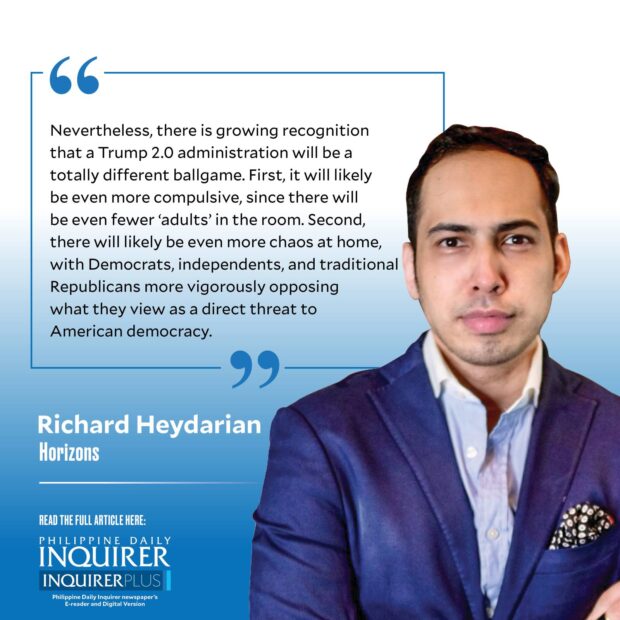Should we ‘de-risk’ from Trump, too?

Perhaps no city better embodies the “End of History” zeitgeist than Berlin. From the Brandenburg Gate to the Berlin Wall, one is constantly reminded of a triumphant end to centuries of turmoil and tyranny in the heart of Europe. And yet, even in this great city, there is growing awareness of tectonic shifts in the global order.
Based on recent exchanges with Chancellor Olaf Scholz and some of the leading thinkers in Europe, it’s clear to me that Germany is keenly aware of dark clouds gathering over the horizon. In fact, this was precisely at the heart of Scholz’s historic “zeitenwende” (“epochal turning point”) speech in 2022 on the heels of Russia’s brazen invasion of Ukraine.
As one German expert told me that fateful year, “We have awakened from a quarter-century of unprecedented peace,” referring to the relatively stable and prosperous decades following the collapse of the Berlin Wall in the twilight years of the 20th century. It had become painfully clear to Germany that its “wandel durch handel” (“change through trade”) strategy had failed to produce the desirable outcome among ex-partners such as Russia.
What seems to also trouble German policymakers is not only the rise of China but also the prospect of a new Cold War between the reigning superpowers. And thus, Germany, now the world’s third-largest economy, is determined to explore new paths for global cooperation in tandem with fellow middle powers, especially in the Global South.
After all, the Germans are too astute to fall for misleading metaphors, which reduce much of the world to a “grass” at the mercy of the “two elephants,” America and China. The current international order resembles more of a fertile savanna, where all sorts of relatively strong and competitive animals live in a mixture of harmony and predatory competition. If anything, I think German politics—where two historically dominant yet diminished parties are jostling with all sorts of alternative, energized parties—is an even better metaphor for understanding the evolving balance of power in the global system.
Throughout my visits to the United States, Japan, and Germany in the past month alone, it has become clear to me that China isn’t the only source of major concern. What seemed laughably improbable just a few months ago has now become a palpable possibility. And I commend recent pieces by astute observers such as James Crabtree and David Rothkopf, who have begun to sound the alarm bells over the prospect of a Trump 2.0 administration.
While it’s true that European powers have been more vocal about their concerns, this doesn’t mean that self-defeating complacency is the order of the day in Asia. It’s true that “de-risking” from China is a dominant theme among America’s Asian allies who are worried about Beijing’s weaponization of supply chains and economic interdependence.
But one thing that struck me during exchanges with, among others, Japanese officials earlier this year was the implication that should Trump win back the White House, all bets are off. Moreover, Asian leaders tend to be circumspect with publicly criticizing domestic politics in allied nations, especially one as powerful and sanctimonious as America.
Nevertheless, there is growing recognition that a Trump 2.0 administration will be a totally different ballgame. First, it will likely be even more compulsive, since there will be even fewer “adults” in the room. By all indications, loyalty tests and so-called “Schedule F” political appointees will trump merit-based recruitment under a second Trump presidency, thus leaving little room for veterans such as James Mattis. And with the possible exception of President Marcos, no current Asian or European leader can reliably lean on “personal diplomacy” with Trump.
Second, there will likely be even more chaos at home, with Democrats, independents, and traditional Republicans more vigorously opposing what they view as a direct threat to American democracy. Ongoing culture wars could transmogrify into micro-civil wars. And finally, the China factor will be even more pronounced, since the Asian superpower has become even more assertive, capable, and prickly in recent years. And this is precisely why America’s allies will have to seriously prepare a separate “de-risk” strategy for a potential Trump 2.0 administration while hoping for the best under whoever the American people choose later this year.
rheydarian@inquirer.com.ph
















